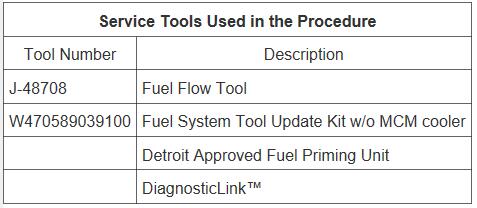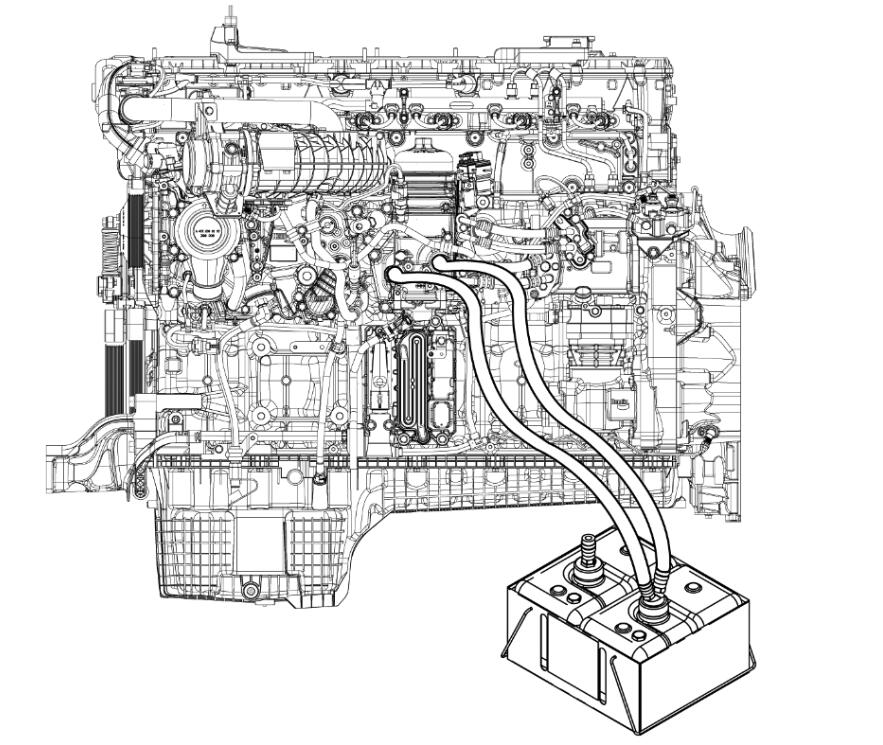This instruction show you guide on how to do chassis fuel system isolation test for DDC-SVC-MAN-0191 GHG17 heavy duty machine.
Preparations:
2024.06 Detroit Diesel Diagnostic Link DDDL 8.20 8.09 Free Download
Procedures:
This test is used to determine if the cause of a hard start or no start condition is on the engine side or the chassis side.

1.Prime the fuel system using a Detroit-approved priming unit.
Note: It is important that the road test is performed to purge the remaining air from the system after priming.
2.Disconnect the chassis-side fuel supply and return lines from the fuel filter module.
3.Using the appropriate adaptors from the W470589039100 Fuel System Tool Update Kit, install the two J-48708 Fuel Flow test lines onto the fuel filter module. Connect the other end of the test lines to the J-48708 fuel flow container. Container should have enough fuel to run a Fuel System Integrity Check (FSIC) and still have at least two liters (2.11 qt.) of fuel remaining.

Note:Do not move or otherwise disturb the Fuel System Update kit and the lines during the next two steps to ensure the ends of the lines remain submerged in fuel.
4.Prime the fuel system using the hand-priming pump.
5.Connect DDDL DiagnosticLink to the vehicle, access the Service Routines section, select the Fuel System Integrity Check (FSIC) tab and run the Automatic FSIC.
WARNING
PERSONAL INJURY
Diesel engine exhaust and some of its constituents are known to the State of California to cause cancer, birth defects, and other reproductive harm.
Always start and operate an engine in a well ventilated area.
If operating an engine in an enclosed area, vent the exhaust to the outside.
Do not modify or tamper with the exhaust system or emission control system.
To avoid injury before starting and running the engine, ensure the vehicle is parked on a level surface, parking brake is set, and the wheels are blocked.
ENGINE EXHAUST
To avoid injury from inhaling engine exhaust, always operate the engine in a well-ventilated area. Engine exhaust is toxic.
6.Wait 15 minutes and then restart engine to ensure there is not a hard start/no start condition.
7.Was there a starting issue?
7.a Yes; verify all connections are tight and ensure that end of fuel lines remain submerged in fuel. Restart from step 4.
7.b No; Go to step 8.
8.Allow engine to sit long enough for previous hard start/no start complaint to be verified.
WARNING
PERSONAL INJURY
Diesel engine exhaust and some of its constituents are known to the State of California to cause cancer, birth defects, and other reproductive harm.
Always start and operate an engine in a well ventilated area.
If operating an engine in an enclosed area, vent the exhaust to the outside.
Do not modify or tamper with the exhaust system or emission control system.
WARNING
PERSONAL INJURY
To avoid injury before starting and running the engine, ensure the vehicle is parked on a level surface, parking brake is set, and the wheels are blocked.
WARNING
ENGINE EXHAUST
To avoid injury from inhaling engine exhaust, always operate the engine in a well-ventilated area. Engine exhaust is toxic.
9.Start engine.
10.Was there a starting issue?
10.a Yes; the cause of the hard start/no start is on the engine side.
10.b No; the cause of the hard start/no start is on the chassis side. Check chassis fuel system lines per OEM procedures.
More cases for Detroit,please refer to:Detroit Diesel Repair